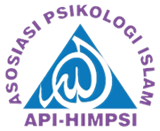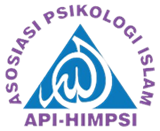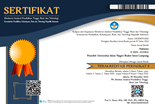The Parenting Self-Efficacy Of Mothers Of Children With Moderate Intellectual Disability In Terms Of Hardiness
Abstract
Parenting a child with an intellectual disability is a difficult challenge for a mother, who must have confidence and resilience to care for and raise a child as a mandate from Allah. This study aims to examine parenting self-efficacy in mothers of children with intellectual disabilities in terms of hardiness. Parenting self-efficacy refers to the perceived ability of parents to positively impact their children's behavior and development. Hardiness is a personality trait that allows people to survive difficult situations (Kobasa, Maddi & Kahn, 1982). This study employed the purposive sampling technique with 57 mothers with intellectually disabled children. The instruments to collect the self-efficacy data were the parenting task index (SEPTI) and the toughness scale. The data was analyzed using the Pearson product-moment correlation formula assisted by JASP 18.1 software for Windows. The study found a significant positive correlation between hardiness and parenting self-efficacy among mothers of intellectually disabled children (R = 0.539 and R² = 0.291, p < 0.01). Thus, parenting self-efficacy effectively contributed 29.1%, with the remaining 70.9% influenced by variables not investigated in this study.
Keywords: Hardiness, parenting self-efficacy, mothers of children with intellectual disability.
Keywords
Full Text:
PDFReferences
Apriyani, N. (2021). Pengembangan Program Intervensi Parental Self-Efficacy Pada Orang Tua Anak Tunagrahita. (Tesis, Universitas Pendidikan Indonesia. http://repository.upi.edu/id/eprint/69925
Arini, D. , Faridah, & Nuraini, I. . (2022). The Relationship of Mother’s Self Efficacy with Cognitive Development and Stunting among Toddlers in the Area of Kalirungkut Puskesmas City, Surabaya. The Malaysian Journal of Nursing (MJN), 14(2), 55-59. https://doi.org/10.31674/mjn.2022.v14i02.010
Bandura, A. (2020). Self‐efficacy. The Wiley Encyclopedia of Personality and Individual Differences, 1994, 387–391. https://doi.org/10.1002/9781118970843.ch243
Begab M. J., Cantwell D. P., Clements J. D., Eyman R. K., Meyers, C. E., Tarjan, G., Warren, S. A. (1983). Classification In Mental Retardation. Washington DC: American Association on Mental Deficiency
Coleman, P. K., & Karraker, K. H. (2000). Parenting self-efficacy among mothers of school-age children: Conceptualization, measurement, and correlates. Family Relations: An Interdisciplinary Journal of Applied Family Studies, 49(1), 13–24. https://doi.org/10.1111/j.1741-3729.2000.00013.x
Damastuti, E. (2020). Buku Ajar: Pendidikan Anak Dengan Hambatan Intelektual. Prodi PLB FKIM ULM
Desiningrum, D. R., & Kurniawati, K. (2023). Parenting Self- Efficacy, Hardiness and Psychological Well-Being of Parents of Children with ASD. Proceedings of International Conference on Psychological Studies (ICPsyche), 4, 328–340. https://doi.org/10.58959/icpsyche.v4i1.50
Endriyani, S. & Yunike, Y. (2017). Having Children with Mental Retardation. International Journal of Public Health Science (IJPHS), 6 (4), 331-336. http://doi.org/10.11591/ijphs.v6i4.10779
Kamila, M. Y., & Sakti, H. (2019). Hubungan Antara Hardiness Dengan Problem Focused Coping Pada Ibu Yang Memiliki Anak Cerebral Palsy di Kota Surakarta. Jurnal Empati, 7(4), 67–73. https://ejournal3.undip.ac.id/index.php/empati/article/view/23425
Kobasa, S.C. (2005). The story of hardiness. Twenty Years of Theorizing Research and Practice. 37. 1-15. Consulting Psychology Journal Practice and Research.
Kobasa, S.C. (1979). Stressful Life Events, Personality and Health: An Inquiry Into Hardiness. Journal of a Personality and Social Psychology.
Kobasa, S.C (2005). The Story of Hardiness: Twenty Years of Theorizing, Research and Practice. Consulting Psychology Journal Practice and Research,54(3), 175-185.
Maddi, S. R. (2006). Hardiness: The courage to grow from stresses. Journal of Positive Psychology, 1(3), 160–168. https://doi.org/10.1080/17439760600619609
Maysa, P., & Khairiyah, U. (2019). Hardiness dan stres pengasuhan pada ibu dengan anak berkebutuhan khusus. Jurnal RAP (Riset Aktual Psikologi Universitas Negeri Padang), 10(1), 88-101.
Olianda, R. A., & Rizal, G. L. (2020). Hubungan Antara Hardiness Dan Dukungan Sosial Terhadap Stres Pengasuhan Pada Ibu Yang Memiliki Anak Tunagrahita. Attadib: Journal of Elementary Education, 4(2), 69. https://doi.org/10.32507/attadib.v4i2.828
Pasyola, N. E., Abdullah, A. M., & Puspasari, D. (2021). Peran Parenting Self-Efficacy dan Optimisme terhadap Psychological Well-Being Ibu yang Memiliki Anak Intellectual Disability. Psympathic: Jurnal Ilmiah Psikologi, 8(1), 131–142. https://doi.org/10.15575/psy.v8i1.12645
Rachmahana, R. S. (2022). Hardiness dan Parenting Self-Efficay pada Orang Tua Anak Berkebutuhan Khusus. Journal of Islamic and Contemporary Psychology, 2(1), 58–72. https://doi.org/10.25299/jicop.v2i1.10373
Rahmawati, R. A., & Ratnaningsih, I. Z. (2020). Hubungan Antara Parenting Self-Efficacy Dan Konflik Pekerjaan-Keluarga Pada Ibu Bekerja Yang Memiliki Anak Usia Sekolah Dasar Di Pt. “X” Cirebon. Jurnal EMPATI, 7(2), 582–590. https://doi.org/10.14710/empati.2018.21681
Santana, I. P., & Istiana, I. (2019). Hubungan antara Religiusitas dengan Hardiness pada Ibu yang Memiliki Anak Berkebutuhan Khusus di SLB Negeri Binjai. Jurnal Diversita, 5(2), 142–148. https://doi.org/10.31289/diversita.v5i2.2839
Sari, D. P. (2020). Perbandingan Efikasi Diri Dalam Pengasuhan Anak Pada Ibu Yang Memiliki Anak Disabilitas Dan Tidak Memiliki Anak Disabilitas. Insight: Jurnal Ilmiah Psikologi, 22(1), 39–45. https://doi.org/10.26486/psikologi.v22i1 Feb.983
Swagery, R. V., & Husna, A. (2017). Hardiness Pada Wanita Karir Single Parent Yang Memiliki Anak Tunarungu. Psikologi, 15(2), 66–73.
Syifa, A., L. & Rizkyanti, C., A. (2022). Pengaruh Keterlibatan Ayah (Father Involvement) Terhadap Empati Pada Remaja Yang Memiliki Saudara Kandung Autisme (Siblings With Autism). Anfusina: Journal of Psychology, 5(1), 1-12. http://dx.doi.org/10.24042/ajp.v5i1.13188
Trihastuti, M., C., W., Panggabean, H., & Marta, R., F. (2023). Parenting Self-Efficacy Ibu dalam Mengasuh Anak dengan Disabilitas. INKLUSI Journal of Disability Studies, 10(1), 49-69. https://doi.org/10.14421/ijds.100103
Yosua, I., Thomas, O., Islamia, I., & Chang, S. (2014). The Differences in Subjective Well-Being among Four Personality Trait Combinations. International Conference on Education, Psychology, and Social SciencesAt: Taipei, Taiwan.
DOI: http://dx.doi.org/10.24042/00202472323900
Refbacks
- There are currently no refbacks.
Copyright (c) 2024 Mustamira Sofa Salsabila













